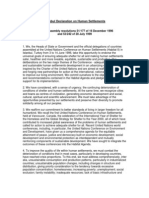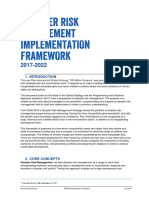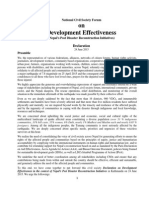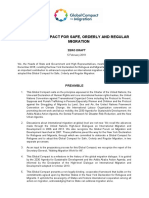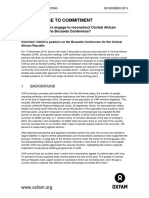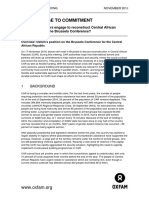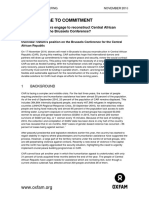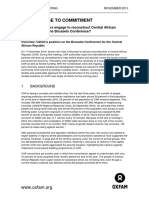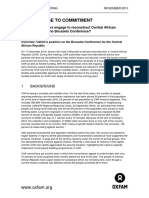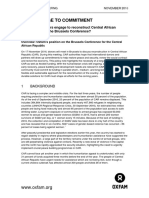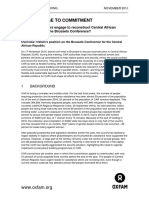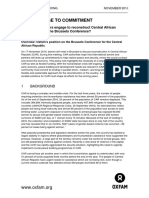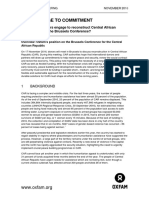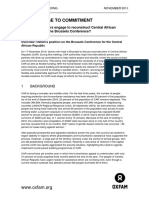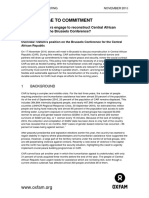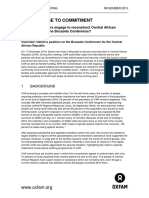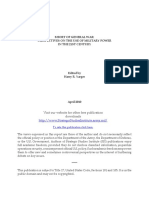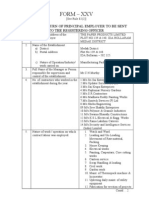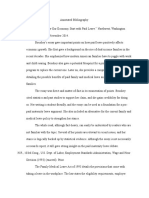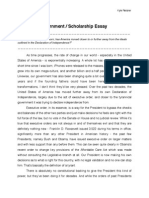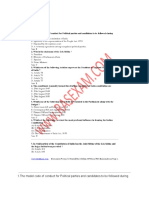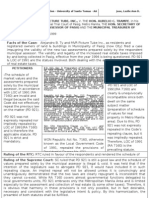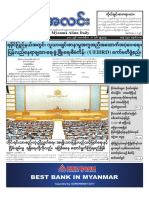Professional Documents
Culture Documents
World Humanitarian Summit Political Communiqué
Uploaded by
WHS Political CommuniqueCopyright
Available Formats
Share this document
Did you find this document useful?
Is this content inappropriate?
Report this DocumentCopyright:
Available Formats
World Humanitarian Summit Political Communiqué
Uploaded by
WHS Political CommuniqueCopyright:
Available Formats
1
Political Communiqu for the World Humanitarian Summit1
On 23-24 May 2016, representatives of the undersigned countries will meet in Istanbul at the
World Humanitarian Summit. We thank the Secretary-General of the United Nations for
convening this historic Summit and the Government of Turkey for hosting it. The SecretaryGenerals ambitious Agenda for Humanity seeks to address global concerns surrounding the
humanitarian impact of multiple, seemingly intractable conflicts, climate change, and natural
disasters that threaten lives today as well as those of future generations, rendering peace and
prosperity elusive while setting back development gains in fragile countries.
We, the undersigned, commit to holding ourselves accountable, to ensuring that our efforts create
a world where we can more effectively address the needs of the 125 million people seeking
assistance and protection, and to leaving no one behind, recognizing we are living in a world
where 60 million people are today forcibly displaced from their homes. Specifically, we commit
to supporting the five core responsibilities outlined in the Secretary-Generals Agenda for
Humanity and use them as a rallying call for action, change, and accountability to better support
those in need of humanitarian assistance.
First, we commit to use global leadership to prevent and end conflicts. We will do more to
prevent crisis situations from deteriorating further and focus more attention on tackling root
causes of conflict. We welcome the Secretary-Generals call to end need, change lives, and
commit to a new model of working that puts those affected by conflict and disaster at the center
of planning and decision-making. We commit to empowering affected people to drive their own
response to crises, in particular to strengthen the voice, choice, and control of crisis-affected
women and girls, children and youth, older people, and people with disabilities. We will take
concrete action to protect against sexual and gender-based violence and provide support to the
survivors of such crimes when they do occur in crisis situations. With the humanitarian
principles of humanity, neutrality, impartiality, and independence as our point of departure, we
commit to transforming humanitarian action so that it is fit to address the scale, complexity, and
duration of the crises of the 21st century.
Second, we commit to uphold the norms that safeguard humanity. We will renew and revitalize
our commitment to upholding humanitarian principles and International Humanitarian Law. We
aspire to a global order that is based on full respect for the norms enshrined in the Charter of the
United Nations. We confirm also our respect for the norms and standards that safeguard
civilians in conflict as well as the personnel who provide assistance. We reaffirm in particular
the importance of respecting and protecting medical personnel and facilities in conflict zones.
This Communique is not legally binding and does not affect the signatories existing obligations under applicable
international and domestic law. Rather, the signatures below reflect the high-level political commitments of the
Member States represented.
Third, we commit to leave no one behind. We will promote a new approach to displaced people,
which will enable them to receive protection and assistance close to their homes. Where people
have to flee, we will help create and provide possible earning opportunities and education at all
levels as well as health services for refugees and host communities. We reaffirm the institution
of asylum and the principle of non-refoulement and also commit to relieve some of the pressures
on host countries by expanding means of resettlement and admission for refugees. We commit
to focus more on reconciliation between and among communities in conflict, and to support the
emergence of safe, dignified, and durable solutions for refugees and internally displaced persons,
while recognizing that voluntary return to the places of origin under stable conditions is the
overarching goal. We commit also to working together to improve national disaster resilience
and response efforts and acknowledge that disasters and the effects of climate change play a role
in driving displacement. We will work to strengthen national and local capacities in these
different contexts. We view these commitments as critical issues for all countries and all
stakeholders, acting in collaborative partnership, in the implementation of the 2030 Agenda for
Sustainable Development.
Fourth, we commit to shift from delivering aid to ending need. As we do this, we recognize the
need for humanitarian and development work to be mutually reinforcing and interrelated. We
come to Istanbul convinced that the new approach outlined by the Secretary-General to deliver
assistance with individuals at the center of the response, the 2030 Agenda adopted by the
General Assembly, and the new tools and opportunities created by technology require supporting
and investing in a workforce trained to deliver results on the Agenda for Humanity and the 2030
Agenda. We will work closely with academic and research institutions as well as networks
around the world to develop tomorrows leaders within Member States and the UN system who
will drive this transformational agenda.
Finally, but not least, we commit to invest in humanity. We will provide financing and
assistance differently, approaching it in a way that promotes and reinforces the coherent delivery
of outcomes for affected populations. We recognize the need to make effective use of financing
instruments such as pooled funds for humanitarian assistance. We recognize also the need to
secure commitments to tackle unprecedented forced displacement and to match lifesaving
assistance with longer-term support for livelihoods and education, also recognizing that the
principle of responsibility-sharing in humanitarian response will lay the groundwork for more
predictable and equitable responses. We will promote migration that is safe, regular, and
orderly. We will strive to support those States most affected or vulnerable to climate change and
climate-related disasters in accessing climate finance, taking into account their needs and
priorities. We recognize the importance of initiatives being launched by the World Bank Group,
regional and international development banks, and other international financial institutions as
they refocus and apply new tools to better address protracted, recurrent, and predictable crises.
We welcome in particular the World Banks new financing initiatives to support refugees and
host communities in Jordan and Lebanon and note that these initiatives serve as models for other
countries, recognizing the global public good that countries with large refugee populations
provide across Africa and Asia, and we will explore additional financing with countries that have
large refugee populations.
We are confident that taken together, these efforts can collectively and jointly deliver on the
Agenda for Humanity.
Signed,
Albania
Andorra
Antigua and Barbuda
Argentina
Australia
Austria
Azerbaijan
Bangladesh
Belgium
Bosnia-Herzegovina
Brazil
Bulgaria
Canada
Chile
Croatia
Cyprus
Czech Republic
Denmark
Djibouti
El Salvador
Estonia
Ethiopia
Finland
France
Georgia
Germany
Greece
Honduras
Iceland
Ireland
Israel
Italy
Japan
Jordan
Kazakhstan
Latvia
Liechtenstein
Lithuania
Luxembourg
Malta
Micronesia
Monaco
Montenegro
Morocco
Netherlands
Niger
Norway
Oman
Peru
Poland
Portugal
Qatar
Republic of Korea
Romania
Rwanda
Samoa
San Marino
Serbia
Seychelles
Slovakia
Slovenia
Somalia
Spain
Swaziland
Sweden
Switzerland
The former Yugoslav Republic of Macedonia
Thailand
Turkey
Ukraine
United Kingdom of Great Britain and Northern Ireland
United States of America
Uruguay
Zambia
The European Union
You might also like
- UN Habitat (1996) Habitat II ING The Habitat Agenda Istanbul Declaration On Human Settlements 20061 (EL)Document3 pagesUN Habitat (1996) Habitat II ING The Habitat Agenda Istanbul Declaration On Human Settlements 20061 (EL)Sebastián Almeida ChicaizaNo ratings yet
- Istanbul Declaration On Human SettlementsDocument4 pagesIstanbul Declaration On Human SettlementsFaridOthmanNo ratings yet
- UNHCR Refugee UpliftmentDocument12 pagesUNHCR Refugee Upliftmentpankarvi6No ratings yet
- Glo DRM - Implementation - Framework Final Io Eng Jul17Document12 pagesGlo DRM - Implementation - Framework Final Io Eng Jul17faqih rasyidNo ratings yet
- 2282agendaforhumanity PDFDocument14 pages2282agendaforhumanity PDFChess NutsNo ratings yet
- Lesson-Week-13-GaD (1)Document8 pagesLesson-Week-13-GaD (1)bpa.galsimaaNo ratings yet
- Global Compact For MigrationDocument27 pagesGlobal Compact For MigrationAnonymous gpQBFLdABNo ratings yet
- Worldconnectors Statement On Sustainable World CitizenshipDocument4 pagesWorldconnectors Statement On Sustainable World CitizenshipWorldconnectorsNo ratings yet
- Drets Culturals413Document3 pagesDrets Culturals413RahulNo ratings yet
- DNA of North AmericaDocument6 pagesDNA of North AmericaSharvar DanielsNo ratings yet
- CSO Declration - 24 June-FinalDocument4 pagesCSO Declration - 24 June-FinalSam PradhanNo ratings yet
- From Pledge To Commitment: How Should Donors Engage To Reconstruct Central African Republic During The Brussels Conference?Document4 pagesFrom Pledge To Commitment: How Should Donors Engage To Reconstruct Central African Republic During The Brussels Conference?OxfamNo ratings yet
- From Pledge To Commitment: How Should Donors Engage To Reconstruct Central African Republic During The Brussels Conference?Document4 pagesFrom Pledge To Commitment: How Should Donors Engage To Reconstruct Central African Republic During The Brussels Conference?OxfamNo ratings yet
- GCM Zero Draft FinalDocument25 pagesGCM Zero Draft FinalPamela Andrés Del CastilloNo ratings yet
- From Pledge To Commitment: How Should Donors Engage To Reconstruct Central African Republic During The Brussels Conference?Document4 pagesFrom Pledge To Commitment: How Should Donors Engage To Reconstruct Central African Republic During The Brussels Conference?OxfamNo ratings yet
- From Pledge To Commitment: How Should Donors Engage To Reconstruct Central African Republic During The Brussels Conference?Document4 pagesFrom Pledge To Commitment: How Should Donors Engage To Reconstruct Central African Republic During The Brussels Conference?OxfamNo ratings yet
- From Pledge To Commitment: How Should Donors Engage To Reconstruct Central African Republic During The Brussels Conference?Document4 pagesFrom Pledge To Commitment: How Should Donors Engage To Reconstruct Central African Republic During The Brussels Conference?OxfamNo ratings yet
- From Pledge To Commitment: How Should Donors Engage To Reconstruct Central African Republic During The Brussels Conference?Document4 pagesFrom Pledge To Commitment: How Should Donors Engage To Reconstruct Central African Republic During The Brussels Conference?OxfamNo ratings yet
- From Pledge To Commitment: How Should Donors Engage To Reconstruct Central African Republic During The Brussels Conference?Document4 pagesFrom Pledge To Commitment: How Should Donors Engage To Reconstruct Central African Republic During The Brussels Conference?OxfamNo ratings yet
- From Pledge To Commitment: How Should Donors Engage To Reconstruct Central African Republic During The Brussels Conference?Document4 pagesFrom Pledge To Commitment: How Should Donors Engage To Reconstruct Central African Republic During The Brussels Conference?OxfamNo ratings yet
- From Pledge To Commitment: How Should Donors Engage To Reconstruct Central African Republic During The Brussels Conference?Document4 pagesFrom Pledge To Commitment: How Should Donors Engage To Reconstruct Central African Republic During The Brussels Conference?OxfamNo ratings yet
- From Pledge To Commitment: How Should Donors Engage To Reconstruct Central African Republic During The Brussels Conference?Document4 pagesFrom Pledge To Commitment: How Should Donors Engage To Reconstruct Central African Republic During The Brussels Conference?OxfamNo ratings yet
- From Pledge To Commitment: How Should Donors Engage To Reconstruct Central African Republic During The Brussels Conference?Document4 pagesFrom Pledge To Commitment: How Should Donors Engage To Reconstruct Central African Republic During The Brussels Conference?OxfamNo ratings yet
- From Pledge To Commitment: How Should Donors Engage To Reconstruct Central African Republic During The Brussels Conference?Document4 pagesFrom Pledge To Commitment: How Should Donors Engage To Reconstruct Central African Republic During The Brussels Conference?OxfamNo ratings yet
- From Pledge To Commitment: How Should Donors Engage To Reconstruct Central African Republic During The Brussels Conference?Document4 pagesFrom Pledge To Commitment: How Should Donors Engage To Reconstruct Central African Republic During The Brussels Conference?OxfamNo ratings yet
- From Pledge To Commitment: How Should Donors Engage To Reconstruct Central African Republic During The Brussels Conference?Document4 pagesFrom Pledge To Commitment: How Should Donors Engage To Reconstruct Central African Republic During The Brussels Conference?OxfamNo ratings yet
- From Pledge To Commitment: How Should Donors Engage To Reconstruct Central African Republic During The Brussels Conference?Document4 pagesFrom Pledge To Commitment: How Should Donors Engage To Reconstruct Central African Republic During The Brussels Conference?OxfamNo ratings yet
- From Pledge To Commitment: How Should Donors Engage To Reconstruct Central African Republic During The Brussels Conference?Document4 pagesFrom Pledge To Commitment: How Should Donors Engage To Reconstruct Central African Republic During The Brussels Conference?OxfamNo ratings yet
- From Pledge To Commitment: How Should Donors Engage To Reconstruct Central African Republic During The Brussels Conference?Document4 pagesFrom Pledge To Commitment: How Should Donors Engage To Reconstruct Central African Republic During The Brussels Conference?OxfamNo ratings yet
- From Pledge To Commitment: How Should Donors Engage To Reconstruct Central African Republic During The Brussels Conference?Document4 pagesFrom Pledge To Commitment: How Should Donors Engage To Reconstruct Central African Republic During The Brussels Conference?OxfamNo ratings yet
- From Pledge To Commitment: How Should Donors Engage To Reconstruct Central African Republic During The Brussels Conference?Document4 pagesFrom Pledge To Commitment: How Should Donors Engage To Reconstruct Central African Republic During The Brussels Conference?OxfamNo ratings yet
- From Pledge To Commitment: How Should Donors Engage To Reconstruct Central African Republic During The Brussels Conference?Document4 pagesFrom Pledge To Commitment: How Should Donors Engage To Reconstruct Central African Republic During The Brussels Conference?OxfamNo ratings yet
- From Pledge To Commitment: How Should Donors Engage To Reconstruct Central African Republic During The Brussels Conference?Document4 pagesFrom Pledge To Commitment: How Should Donors Engage To Reconstruct Central African Republic During The Brussels Conference?OxfamNo ratings yet
- From Pledge To Commitment: How Should Donors Engage To Reconstruct Central African Republic During The Brussels Conference?Document4 pagesFrom Pledge To Commitment: How Should Donors Engage To Reconstruct Central African Republic During The Brussels Conference?OxfamNo ratings yet
- From Pledge To Commitment: How Should Donors Engage To Reconstruct Central African Republic During The Brussels Conference?Document4 pagesFrom Pledge To Commitment: How Should Donors Engage To Reconstruct Central African Republic During The Brussels Conference?OxfamNo ratings yet
- From Pledge To Commitment: How Should Donors Engage To Reconstruct Central African Republic During The Brussels Conference?Document4 pagesFrom Pledge To Commitment: How Should Donors Engage To Reconstruct Central African Republic During The Brussels Conference?OxfamNo ratings yet
- From Pledge To Commitment: How Should Donors Engage To Reconstruct Central African Republic During The Brussels Conference?Document4 pagesFrom Pledge To Commitment: How Should Donors Engage To Reconstruct Central African Republic During The Brussels Conference?OxfamNo ratings yet
- From Pledge To Commitment: How Should Donors Engage To Reconstruct Central African Republic During The Brussels Conference?Document4 pagesFrom Pledge To Commitment: How Should Donors Engage To Reconstruct Central African Republic During The Brussels Conference?OxfamNo ratings yet
- From Pledge To Commitment: How Should Donors Engage To Reconstruct Central African Republic During The Brussels Conference?Document4 pagesFrom Pledge To Commitment: How Should Donors Engage To Reconstruct Central African Republic During The Brussels Conference?OxfamNo ratings yet
- From Pledge To Commitment: How Should Donors Engage To Reconstruct Central African Republic During The Brussels Conference?Document4 pagesFrom Pledge To Commitment: How Should Donors Engage To Reconstruct Central African Republic During The Brussels Conference?OxfamNo ratings yet
- From Pledge To Commitment: How Should Donors Engage To Reconstruct Central African Republic During The Brussels Conference?Document4 pagesFrom Pledge To Commitment: How Should Donors Engage To Reconstruct Central African Republic During The Brussels Conference?OxfamNo ratings yet
- From Pledge To Commitment: How Should Donors Engage To Reconstruct Central African Republic During The Brussels Conference?Document4 pagesFrom Pledge To Commitment: How Should Donors Engage To Reconstruct Central African Republic During The Brussels Conference?OxfamNo ratings yet
- From Pledge To Commitment: How Should Donors Engage To Reconstruct Central African Republic During The Brussels Conference?Document4 pagesFrom Pledge To Commitment: How Should Donors Engage To Reconstruct Central African Republic During The Brussels Conference?OxfamNo ratings yet
- From Pledge To Commitment: How Should Donors Engage To Reconstruct Central African Republic During The Brussels Conference?Document4 pagesFrom Pledge To Commitment: How Should Donors Engage To Reconstruct Central African Republic During The Brussels Conference?OxfamNo ratings yet
- From Pledge To Commitment: How Should Donors Engage To Reconstruct Central African Republic During The Brussels Conference?Document4 pagesFrom Pledge To Commitment: How Should Donors Engage To Reconstruct Central African Republic During The Brussels Conference?OxfamNo ratings yet
- From Pledge To Commitment: How Should Donors Engage To Reconstruct Central African Republic During The Brussels Conference?Document4 pagesFrom Pledge To Commitment: How Should Donors Engage To Reconstruct Central African Republic During The Brussels Conference?OxfamNo ratings yet
- From Pledge To Commitment: How Should Donors Engage To Reconstruct Central African Republic During The Brussels Conference?Document4 pagesFrom Pledge To Commitment: How Should Donors Engage To Reconstruct Central African Republic During The Brussels Conference?OxfamNo ratings yet
- From Pledge To Commitment: How Should Donors Engage To Reconstruct Central African Republic During The Brussels Conference?Document4 pagesFrom Pledge To Commitment: How Should Donors Engage To Reconstruct Central African Republic During The Brussels Conference?OxfamNo ratings yet
- From Pledge To Commitment: How Should Donors Engage To Reconstruct Central African Republic During The Brussels Conference?Document4 pagesFrom Pledge To Commitment: How Should Donors Engage To Reconstruct Central African Republic During The Brussels Conference?OxfamNo ratings yet
- From Pledge To Commitment: How Should Donors Engage To Reconstruct Central African Republic During The Brussels Conference?Document4 pagesFrom Pledge To Commitment: How Should Donors Engage To Reconstruct Central African Republic During The Brussels Conference?OxfamNo ratings yet
- From Pledge To Commitment: How Should Donors Engage To Reconstruct Central African Republic During The Brussels Conference?Document4 pagesFrom Pledge To Commitment: How Should Donors Engage To Reconstruct Central African Republic During The Brussels Conference?OxfamNo ratings yet
- From Pledge To Commitment: How Should Donors Engage To Reconstruct Central African Republic During The Brussels Conference?Document4 pagesFrom Pledge To Commitment: How Should Donors Engage To Reconstruct Central African Republic During The Brussels Conference?OxfamNo ratings yet
- From Pledge To Commitment: How Should Donors Engage To Reconstruct Central African Republic During The Brussels Conference?Document4 pagesFrom Pledge To Commitment: How Should Donors Engage To Reconstruct Central African Republic During The Brussels Conference?OxfamNo ratings yet
- From Pledge To Commitment: How Should Donors Engage To Reconstruct Central African Republic During The Brussels Conference?Document4 pagesFrom Pledge To Commitment: How Should Donors Engage To Reconstruct Central African Republic During The Brussels Conference?OxfamNo ratings yet
- From Pledge To Commitment: How Should Donors Engage To Reconstruct Central African Republic During The Brussels Conference?Document4 pagesFrom Pledge To Commitment: How Should Donors Engage To Reconstruct Central African Republic During The Brussels Conference?OxfamNo ratings yet
- From Pledge To Commitment: How Should Donors Engage To Reconstruct Central African Republic During The Brussels Conference?Document4 pagesFrom Pledge To Commitment: How Should Donors Engage To Reconstruct Central African Republic During The Brussels Conference?OxfamNo ratings yet
- From Pledge To Commitment: How Should Donors Engage To Reconstruct Central African Republic During The Brussels Conference?Document4 pagesFrom Pledge To Commitment: How Should Donors Engage To Reconstruct Central African Republic During The Brussels Conference?OxfamNo ratings yet
- From Pledge To Commitment: How Should Donors Engage To Reconstruct Central African Republic During The Brussels Conference?Document4 pagesFrom Pledge To Commitment: How Should Donors Engage To Reconstruct Central African Republic During The Brussels Conference?OxfamNo ratings yet
- From Pledge To Commitment: How Should Donors Engage To Reconstruct Central African Republic During The Brussels Conference?Document4 pagesFrom Pledge To Commitment: How Should Donors Engage To Reconstruct Central African Republic During The Brussels Conference?OxfamNo ratings yet
- United States Court of Appeals, Fourth CircuitDocument6 pagesUnited States Court of Appeals, Fourth CircuitScribd Government DocsNo ratings yet
- Dr. P.K. Ebert v. The Board of Regents of The University System of Georgia, 11th Cir. (2011)Document14 pagesDr. P.K. Ebert v. The Board of Regents of The University System of Georgia, 11th Cir. (2011)Scribd Government DocsNo ratings yet
- Short of General War: Perspectives On The Use of Military Power in The 21st CenturyDocument288 pagesShort of General War: Perspectives On The Use of Military Power in The 21st CenturySSI-Strategic Studies Institute-US Army War CollegeNo ratings yet
- Form XXVDocument5 pagesForm XXVK Srinivasa RaoNo ratings yet
- Jusmag V NLRCDocument4 pagesJusmag V NLRCOliveros DMNo ratings yet
- 3oct Law156 ClederaDocument20 pages3oct Law156 ClederaAllen ClederaNo ratings yet
- Class 7 History I TERM Examination 2021-22Document3 pagesClass 7 History I TERM Examination 2021-22Aadhinaathan AadhiNo ratings yet
- MCQsDocument2 pagesMCQsIbrar khan100% (1)
- Names and Address of Advocates-on-Record (AoR) of Supreme Court of India - As On 06/08/2012Document123 pagesNames and Address of Advocates-on-Record (AoR) of Supreme Court of India - As On 06/08/2012Shrikant Hathi86% (7)
- Annotated BibliographyDocument5 pagesAnnotated BibliographyspadesofaceNo ratings yet
- Government Scholarship EssayDocument2 pagesGovernment Scholarship Essayapi-211927891No ratings yet
- Aiu Eligibility Proforma For Inter University TournamentsDocument2 pagesAiu Eligibility Proforma For Inter University TournamentsDrNarayan KRNo ratings yet
- Daily Express (12 Dec 2019)Document72 pagesDaily Express (12 Dec 2019)Strontium EtheriumNo ratings yet
- 10.19.2010 Defendant's Second Request For Discovery To Plaintiff (Notice of Deficient Responses)Document5 pages10.19.2010 Defendant's Second Request For Discovery To Plaintiff (Notice of Deficient Responses)Jillian SheridanNo ratings yet
- Mughal Empire AdministrationDocument25 pagesMughal Empire AdministrationradhakrishnaNo ratings yet
- 3.06&3.07 - Limcoma V Republic & Lacamen V LaruanDocument1 page3.06&3.07 - Limcoma V Republic & Lacamen V LaruanKate GaroNo ratings yet
- Current Affairs Mcqs InamDocument28 pagesCurrent Affairs Mcqs Inaminam rehmanNo ratings yet
- PRAKTIS SOLUTIONS LIMITED - Company Accounts From Level BusinessDocument7 pagesPRAKTIS SOLUTIONS LIMITED - Company Accounts From Level BusinessLevel BusinessNo ratings yet
- The Bangladesh Legal Practitioner's and Bar Council Order, 1972 (President's Order)Document23 pagesThe Bangladesh Legal Practitioner's and Bar Council Order, 1972 (President's Order)dedarulNo ratings yet
- Moro Islamic Liberation FrontDocument6 pagesMoro Islamic Liberation FrontPSSg Mikaila Ma. JurialNo ratings yet
- MCQ Indian Constitution PDF PDFDocument20 pagesMCQ Indian Constitution PDF PDFjairaj321No ratings yet
- Statutory Construction Case on Tax AssessmentsDocument1 pageStatutory Construction Case on Tax AssessmentsleslieannjoseNo ratings yet
- Sample Birth Affidavit by Uncle or Close Relative - U.SDocument2 pagesSample Birth Affidavit by Uncle or Close Relative - U.SSyed Waqas Ahmed100% (1)
- The Problem and Its Background: Manila LawDocument16 pagesThe Problem and Its Background: Manila LawShaaaaaai0% (1)
- DUMBARTON OAKS PROPOSALSDocument12 pagesDUMBARTON OAKS PROPOSALSCristinel RisteaNo ratings yet
- Life of RizalDocument7 pagesLife of RizalyssaNo ratings yet
- Myanma Alinn Daily - 18 October 2017 Newpapers PDFDocument36 pagesMyanma Alinn Daily - 18 October 2017 Newpapers PDFThit Htoo LwinNo ratings yet
- Macalintal v. Commission On ElectionsDocument137 pagesMacalintal v. Commission On ElectionsChristian Edward CoronadoNo ratings yet
- Conduct MeetingDocument32 pagesConduct MeetingRon TeeNo ratings yet
- Times Leader 12-20-2011Document40 pagesTimes Leader 12-20-2011The Times LeaderNo ratings yet

